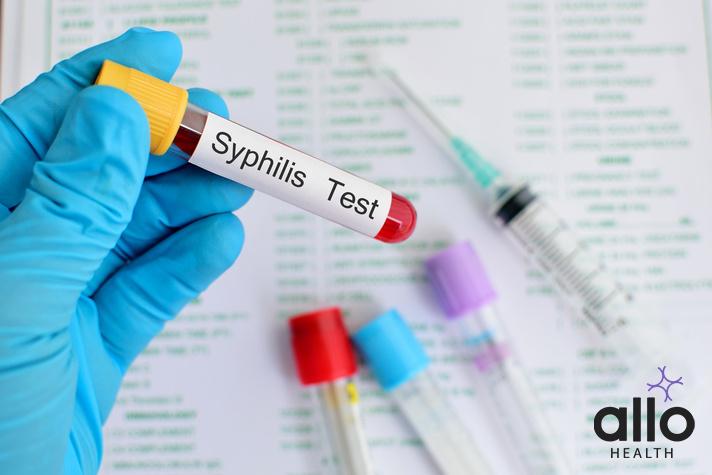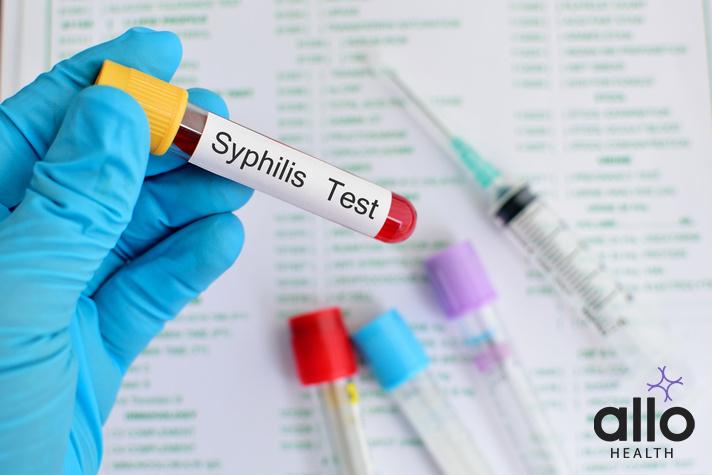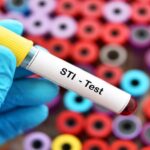What is RPR Test for Syphilis?

Allo Health is dedicated to personalized well-being, offering support and trusted information tailored to individual health goals. The platform emphasizes human-generated content, led by a distinguished medical team of experts, including physicians and sexual health specialists. Their commitment to credibility involves rigorous fact-checking, authoritative research, and continuous updates to ensure accurate, up-to-date information. Allo Health's unique approach goes beyond conventional platforms, providing expert-led insights and a continuous commitment to excellence, with user feedback playing a crucial role in shaping the platform's authoritative voice.

Dr Sanina Mansoor holds MBBS degree from Yenepoya university,Mangalore.She has 8 years of experience working as a medical officer at various health centres and medical colleges.
Why This Was Upated?
Our experts continually monitor the health and wellness space, and we update our articles when new information became available.
Updated on 20 May, 2024
- Article was updated as part of our commitment to diversity, equity, and inclusion.

"The following blog article provides general information and insights on various topics. However, it is important to note that the information presented is not intended as professional advice in any specific field or area. The content of this blog is for general educational and informational purposes only.
Book consultation
The content should not be interpreted as endorsement, recommendation, or guarantee of any product, service, or information mentioned. Readers are solely responsible for the decisions and actions they take based on the information provided in this blog. It is essential to exercise individual judgment, critical thinking, and personal responsibility when applying or implementing any information or suggestions discussed in the blog."
Syphilis, caused by the bacterium Treponema pallidum, remains a significant public health concern globally. To effectively diagnose this sexually transmitted infection (STI), healthcare providers commonly utilize the Rapid Plasma Reagin (RPR) test. This article provides a detailed overview of the RPR test, its significance in diagnosing syphilis, testing procedures, interpretation of results, and implications for treatment and prevention.
What is Syphilis and Its Different Diagnostic Tests?
Syphilis is a bacterial infection caused by Treponema pallidum, primarily transmitted through sexual contact. It progresses through several stages, each with unique symptoms and implications for diagnosis and treatment.
Different Diagnostic Tests for Syphilis:
- RPR Test: Rapid plasma reagin test screens for syphilis antibodies in a blood sample, aiding in initial screening and monitoring treatment response.
- FTA-ABS Test: Fluorescent treponemal antibody absorption test confirms syphilis diagnosis by detecting specific antibodies to the syphilis bacteria, often used to confirm positive RPR results.
- CSF Test: Cerebrospinal Fluid test examines fluid surrounding the brain and spinal cord to diagnose neurosyphilis, a severe form of the disease affecting the central nervous system.
- At-Home Test Kits: At-home test kits offer convenience and privacy, allowing individuals to collect samples at home and send them to a lab for analysis.
- Combination Tests: Sequential serologic tests combine both nontreponemal test and treponemal antibody tests to increase diagnostic accuracy, especially in early and late stages of infection.
- Clinical Signs and Symptoms: Healthcare providers also consider clinical signs such as skin sores, rashes, and systemic symptoms like fever and weight loss, along with the patient’s medical history and risk factors, to diagnose syphilis accurately.
Each of these diagnostic methods plays a crucial role in identifying syphilis infection and guiding appropriate treatment strategies, ultimately aiding in the prevention and control of this sexually transmitted disease.
What is the RPR Test for Syphilis?
The RPR test for syphilis is a screening method designed to detect antibodies to syphilis in a blood sample. Here’s a breakdown of its key aspects:
- Purpose: The primary objective of the RPR test is to identify the presence of antibodies produced by the body in response to the syphilis bacteria (Treponema pallidum).
- Procedure: A healthcare provider collects a sample of blood from the patient, usually through a vein in the arm, using a needle and syringe. This sample is then sent to a laboratory for testing.
- Testing Method: In the laboratory, the blood sample is mixed with a substance that reacts with syphilis antibodies. The reaction produces a visible result, which is then interpreted by healthcare professionals.
- Interpretation of Results: A positive result indicates the presence of syphilis antibodies in the blood, suggesting either a current or past infection. However, confirmation through additional testing, such as treponemal antibody tests, is necessary to confirm the diagnosis. A negative (“non-reactive”) result does not rule out syphilis infection, especially in the early stages of the disease.
- Significance: The RPR test is crucial for initial screening and diagnosing syphilis, guiding treatment decisions, monitoring treatment response, and preventing the spread of the infection, especially among pregnant individuals or those at increased risk for syphilis.
By employing the RPR test, healthcare providers can effectively screen for syphilis and initiate appropriate interventions to manage and prevent its transmission.
Process and Procedure

The RPR test for syphilis involves the following procedure and process:
- Sample Collection: A healthcare provider collects a sample of blood from a vein in the arm of the individual using a needle and syringe during a routine prenatal visit or upon suspicion of syphilis infection.
- Lab Testing: The blood sample is sent to a laboratory for testing. The laboratory technician prepares the sample by mixing it with a substance containing cardiolipin, cholesterol, and lecithin, known as the antigen.
- Reaction: The sample is then observed for any visible reaction, such as clumping (agglutination), which indicates the presence of antibodies to syphilis. The reaction occurs if the person has been exposed to the syphilis bacteria, even if they currently have no symptoms.
- Interpretation: The degree of clumping, known as the titer, is noted and reported. Higher titers suggest a more active or recent infection, while lower titers may indicate past or treated infection.
- Confirmation: A positive RPR test requires confirmation with additional testing, such as treponemal antibody tests, to confirm the diagnosis of syphilis and distinguish between active and past infections.
- Results: The results are communicated to the healthcare provider, who discusses them with the individual and determines the appropriate course of action based on the medical history, risk factors, and clinical presentation.
Overall, the RPR test is a simple blood test that aids in the diagnosis and management of syphilis infection, helping healthcare providers screen for syphilis, assess the stage of infection, and guide treatment decisions.
Accuracy and Efficacy
The accuracy and efficacy of the RPR test for syphilis are contingent upon various factors, including the stage of infection, presence of antibodies, and potential for false-positive or false-negative results:
Accuracy in Diagnosis:
- The RPR test demonstrates high sensitivity and specificity in detecting antibodies to syphilis, particularly during the middle and late stages of infection.
- However, false-positive results can occur due to factors such as autoimmune diseases, recent vaccination, or certain medical conditions, necessitating confirmatory testing with treponemal antibody tests.
Effectiveness in Screening and Monitoring:
- As a primary screening tool, the RPR test effectively identifies individuals at risk for syphilis infection, facilitating early intervention and treatment.
- Monitoring RPR titers over time allows healthcare providers to assess treatment response and disease progression, guiding the duration and efficacy of antibiotic therapy.
Limitations and Considerations:
- In early-stage syphilis, RPR test sensitivity may be lower, leading to false-negative results in some cases, especially within the first few weeks of infection.
- Factors such as the presence of atypical syphilis symptoms or concurrent infections can affect test accuracy and interpretation, requiring additional evaluation and testing.
Overall, while the RPR test serves as a valuable tool in the diagnosis and management of syphilis, healthcare providers must consider its limitations and utilize comprehensive testing approaches to ensure accurate diagnosis and appropriate treatment interventions, especially in high-risk populations such as pregnant women and individuals with a history of syphilis exposure.
Advantages Over Other Diagnostic Tests
The RPR test for syphilis offers several advantages over other diagnostic tests:
- Rapid Results: As the name suggests, the rapid plasma reagin test provides quick results, typically within a few hours, enabling prompt diagnosis and treatment initiation, especially in cases of acute infection or for pregnant individuals during prenatal visits.
- Cost-Effectiveness: Compared to some other tests, the RPR test is relatively inexpensive, making it accessible to a broader population, including those with limited financial resources or in resource-constrained healthcare settings.
- High Sensitivity: The RPR test demonstrates high sensitivity in detecting syphilis antibodies, even during the early stages of infection when symptoms may not be apparent, thus aiding in the early diagnosis and treatment of syphilis to prevent complications and further transmission.
- Routine Screening: Due to its ease of use and reliability, the RPR test is well-suited for routine screening of individuals at risk for syphilis, including pregnant women, sexually active individuals, and those with a history of unprotected sexual contact or multiple sex partners.
- Complementarity with Confirmatory Tests: While the RPR test serves as an initial screening tool, its results can be corroborated with more specific confirmatory tests, such as treponemal antibody tests, to ensure accurate diagnosis and appropriate management of syphilis infections.
The RPR test for syphilis stands out for its rapidity, affordability, sensitivity, suitability for routine screening, and complementary role in confirming diagnoses, making it a valuable tool in the comprehensive management of syphilis infections.
Interpreting Results of RPR Test for Syphilis

Positive Result:
- Indicates the presence of syphilis antibodies in the blood, suggesting an active or past infection.
- Further confirmation through treponemal antibody tests is necessary to confirm diagnosis.
- Positive results may vary in titer, indicating the stage of infection or response to treatment.
Negative Result:
- Does not necessarily rule out syphilis, especially during early stages or if antibodies are not yet detectable.
- Repeat testing may be necessary if there is a high suspicion of infection or ongoing risk exposure.
Quantitative Assessment:
- RPR titers provide quantitative data on antibody levels, aiding in monitoring disease progression and treatment response.
- Rising titers may indicate active infection, while declining titers suggest successful treatment.
Clinical Correlation:
- Results should be interpreted alongside clinical signs, medical history, and risk factors for syphilis.
- Additional testing, such as sampling fluid from skin sores or lesions, may be warranted for comprehensive evaluation.
Consultation with Healthcare Provider:
- Interpretation of results and subsequent management should involve consultation with a healthcare provider or professional.
- Decisions regarding treatment initiation, monitoring, and follow-up testing should be made in collaboration with a healthcare team.
Consideration for Special Populations:
- Pregnant individuals require prompt and accurate diagnosis to prevent congenital syphilis transmission.
- Persons with autoimmune diseases or atypical syphilis presentations may necessitate tailored testing and management approaches.
Conclusion
The RPR test for syphilis is a valuable tool in the diagnosis and management of this bacterial infection. By detecting the presence of syphilis antibodies in a sample of blood, this test helps healthcare providers identify active infections, monitor treatment response, and prevent the spread of syphilis. However, it is essential to interpret RPR test results in conjunction with clinical signs, medical history, and additional testing to ensure accurate diagnosis and effective treatment.
Most Asked Questions
-
What is the RPR test, and how does it work?
The RPR test is a blood test used to check for antibodies to syphilis, a bacterial infection. During the test, a small sample of blood is taken from your arm and mixed with a substance that reacts if syphilis antibodies are present. This helps healthcare providers determine if you have been infected with syphilis.
-
Why is the RPR test important for diagnosing syphilis?
The RPR test is crucial for detecting syphilis infection early on. It helps healthcare providers assess the stage of infection and decide on the right treatment. By monitoring the levels of syphilis antibodies in your blood over time, they can also see how well the treatment is working.
-
What should I do if my RPR test comes back positive?
If your RPR test is positive, it means that you have antibodies to syphilis in your blood. However, it’s essential to confirm the diagnosis with further testing. Your healthcare provider will discuss the next steps, which may include additional tests and starting antibiotic treatment to cure the infection.
-
Are there any special considerations for getting the RPR test?
Yes, certain groups, like pregnant individuals, should undergo routine screening for syphilis to prevent passing the infection to their babies. If you have symptoms of syphilis or think you may have been exposed to the infection through sexual contact, talk to your healthcare provider about getting tested. It’s essential to prioritize your sexual health and seek medical care if you have any concerns.






































